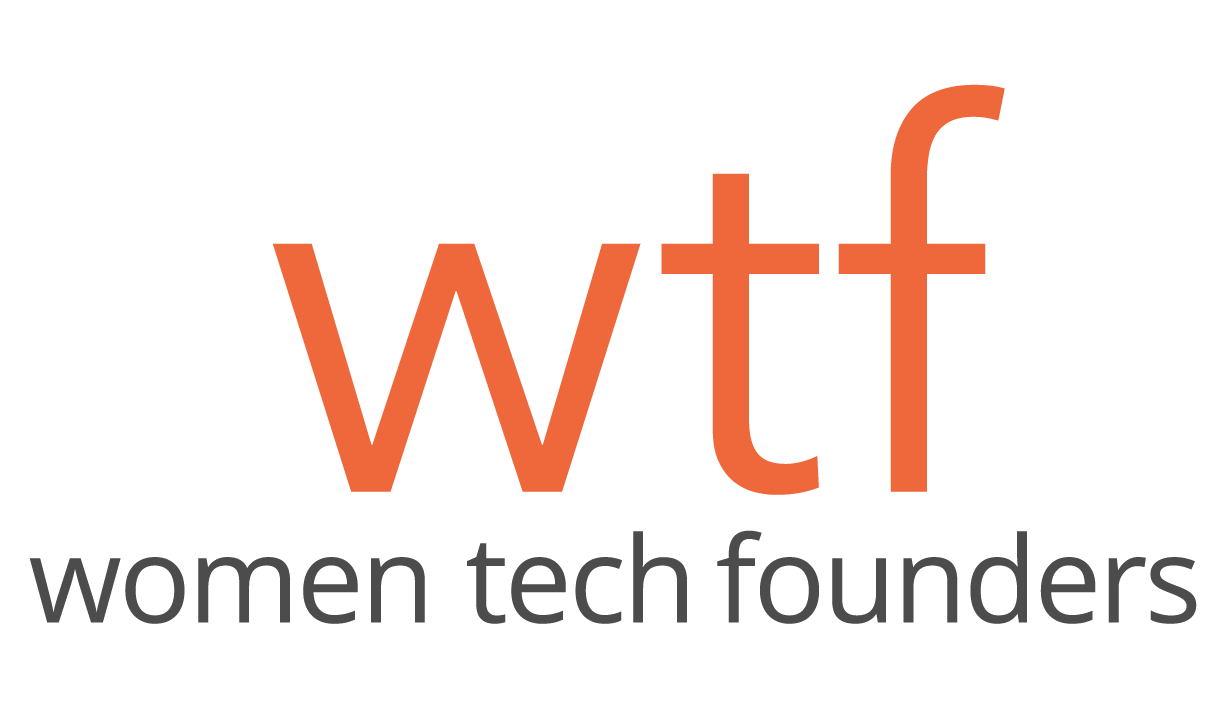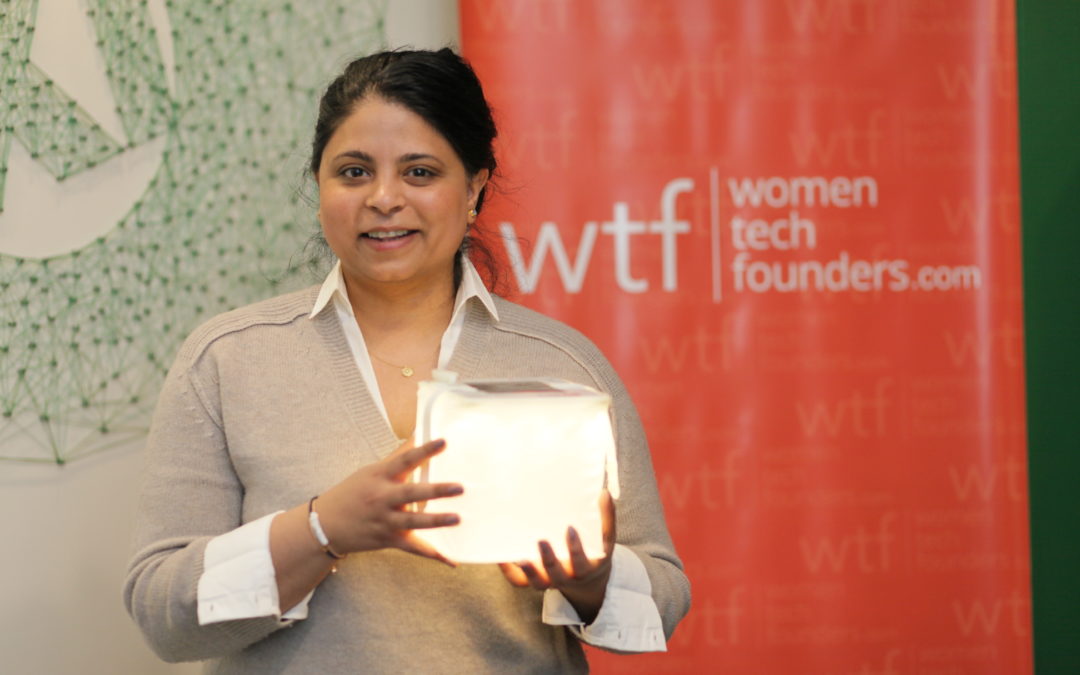Meet Andrea Sreshta, our national 2019 Women in Tech Award winner and co-founder of LuminAID, a SharkTank-invested startup that makes lightweight, waterproof, solar-rechargeable devices that diffuse light like a lantern. Women Tech Founders CEO, Terri Brax, and Propllr’s Jillian Smith sat down with Andrea to learn how she and her co-founder turned an idea for a graduate school project into a Mark Cuban-backed company that helps disaster relief aid around the world. Enjoy the key lessons and insights we gleaned from talking to Andrea about her experience with starting LuminAID.
Graduate School Project Sparks an Idea to Innovate
For Andrea, starting a company was never part of the initial plan. As the daughter of Indian immigrants, she grew up in an environment that emphasized the importance of education and as a result always made it a priority. After completing her bachelor’s degree in Architecture at Yale University and working at an architecture firm for a couple of years, graduate school seemed the next natural step in her career. Shortly after arriving at Columbia University for her master’s degree program in Architecture, she serendipitously crossed paths with Anna Stork, who would be her future business partner. They met while taking the same class and decided to work on a project together. “The assignment was open ended,” Andrea recounts, “We had to design a creative solution for disaster relief. This was in January 2010, right after the Haiti earthquake.” It was with this timely prompt that catapulted Andrea and Anna to take a deep dive into better understanding the challenges people face in disaster recovery areas. “We asked ourselves [one question],” Andrea reflects, ‘‘how can we create something that addresses a basic human need?”
Lesson #1: Clearly define the problem you are solving for.
After immersing themselves in various data points, news reports about the Haiti earthquake, and stories about the earthquake victims struggling on the ground, the answer to this question became clear. Andrea talks about this discovery process: We quickly saw one glaring need: lighting. Nighttime for people living in tents after the earthquake meant highly dangerous conditions. Because Haiti lacked a strong electricity grid and received a lot of natural sunlight, an obvious solution for this unmet need was a solar lantern. Even though portable solar devices weren’t high tech and had been around for a while, they weren’t being widely used on the ground after disasters. We began to think through why this was the case. We realized we needed to create a device that could be easily transported and distributed in large numbers. By investing the time upfront to truly understand and research the problem they were trying to solve, Andrea and her co-founder, Anna, were able to recognize the need to focus on creating a solution that was affordable, portable, and could be easily transported and distributed in large quantities. Armed with these sharp insights, Andrea and Anna committed themselves to building something truly innovative by making 50 prototypes for testing by hand.
“In this phase, we didn’t have a grand plan to turn this into a business. We were committed to creating a technological innovation that could make a difference.”
Lesson #2:Crowdfunding is a viable option for not only for fundraising but also for product feedback and early market research.
As graduate students, Andrea and her co-founder faced a common challenge early on: funding. They opted to try crowdfunding to raise some initial working capital. She highlights the benefits of crowdfunding: We needed to make prototypes that could withstand environmentally tough situations, which was tricky. In 2011, we launched a crowdfunding campaign and received a lot of valuable product feedback and early market insights. We ended up raising over $50,000, which was well over our $10,000 goal.
“We just put one foot in front of the other. Once we had our idea, we began to hone our product over an extended period of time.”
Crowdfunding proved to be helpful in two ways. First, it provided Andrea and her co-founder the capital needed to manufacture and ship their product in larger quantities. Second, the crowdfunding campaign created a platform to receive early adopter feedback that helped uncover interesting insights about potential product uses and markets to tap. Andrea explains how crowdfunding helped her company’s growth: In large part thanks to crowdfunding, we realized we had another market who wanted our product: campers. So we launched a website for camping. That was a surprising way that our company has expanded. Since LuminAID’s first crowdfunding campaign, the startup has gone on to launch multiple successful campaigns, including one that generated nearly $280,000 and a more recent one in 2018 that generated over $100,000. Andrea acknowledges that crowdfunding platforms have changed drastically over the years since her company has first began using them. For founders who are considering a crowdfunding platform, she notes it’s important to review the terms and conditions. She also emphasizes that a successful crowdfunding campaign requires a significant amount of work and preparation. Andrea states, “It’s preparation before the launch that really makes the campaign successful.”
Lesson #3: Use technology to increase productivity.
Like most founders who are bootstrapping and working on small teams, Andrea points out how technology programs and apps are essential for streamlining processes and increasing productivity: We’ve leveraged business operations technology to enhance productivity for working across a small team. For example, we rely a lot on a database program called Airtable to keep us organized, and we hooked it up to all of our systems. We also use a program called Zapier, that provide us with off-the-shelf technology connecting. Because we can’t afford a high-end SaaS system, we’re limited to smaller tech, and there aren’t a lot of alternatives. So we made do. Andrea also sees leveraging technology as a business imperative: Our e-commerce platform has to be comparable to Amazon, because that’s what our customers expect. We’ve learned how to make things work on a small team with limited time and resources. You have to fill in the gaps if you can’t use more established solutions. Though technology can help create shortcuts, Andrea says there are certain areas of the business where you simply cannot cut corners: Another piece of advice for growing startups is to not overlook accounting. It can get messy on the financial side if you don’t have one person dedicated to accounting, as we’ve learned. I’d recommend finding someone to handle your finances.
Lesson #4: Leverage your support networks.
Andrea describes how being part of various support networks have been critical to LuminAid’s success, including her family: I grew up surrounded by people in my family, women in particular, who went on to do great things in business, so that set a good example. Some jobs are viewed as more stable, and I can’t say that running a startup has that reputation. My family was supportive of my decision, but I know others like me might feel compelled to pursue a more traditional career path.
“I’m lucky that I’ve met so many smart people along the way who have helped and inspired LuminAID’s growth.”
She also describes the invaluable network she has at the University of Chicago Booth School especially when it comes to finding mentors and building a team: I came to the University of Chicago to get my MBA, which is where I was really able to leverage the resources available to us and network, grow our team, and find mentors for our product. Finding team members has happened organically, in large part thanks to business school resources and staying in touch with the career center. Booth has been a big pipeline for us. Business school also exposes you to so many different aspects of business excellence, even in casual conversations. I think being around these people lights a fire under you. In addition to business school, Andrea speaks about how she’s benefited from various support networks, including the broader Chicago community, Women Tech Founders, Chicago Innovation and Shark Tank: The Chicago community has also been really helpful in connecting with other people to support our work. Women Tech Founders has been great for meeting other women founders in the city, too. Chicago Innovation has helped us expand our B2B community. A major support network – even though its name suggests the opposite – was being on Shark Tank. The process took a lot of time, but it was a free commercial in front of all of America. Of course, there’s a lot of luck involved in being selected, but being on the show was probably the biggest game changer for our business. It recognized that we were creating a really innovative solution. Because of Shark Tank, we were immensely lucky to have Mark Cuban as our first investor. He’s generally been very supportive and very instructive: we can email him as much as we want, and he keeps in touch. He has a team that also provides support, but he does a surprising amount himself.
Lesson #5 Never stop learning.
Even after completing a master’s degree and an MBA, Andrea still sees building a company as an incredible learning experience: The educational value of my career so far, aside from graduate school, has really come from learning how to build this company. My family’s perspective has helped me see it this way.
“The educational value of my career so far, aside from graduate school, has really come from learning how to build this company.”
Andrea underscores how starting a company has made her an expert in learning new things: I’ve realized how much of a learning experience running a startup is: you do new things all the time. The things we do every week are often things we’re doing for the very first time. And some of those things are hard to learn. To me, entrepreneurship has been an extension of my education. We’ve really lived rich experiences running this company. Each year that goes by feels more like three years, probably because we’re constantly solving new problems. With each new learning experience, Andrea and her team have been able to amplify the impact of LuminAID while not losing sight of its social impact-driven mission: Today, we help thousands of people all around the world by partnering with disaster relief agencies to distribute our product to people living without power, so I think we’ve stayed true to the mission of our grad school project years ago.
LEARN MORE ABOUT THE INCREDIBLE FEMALE FOUNDERS CHANGING THE WORLD AT WOMENTECHFOUNDERS.COM/JOIN

